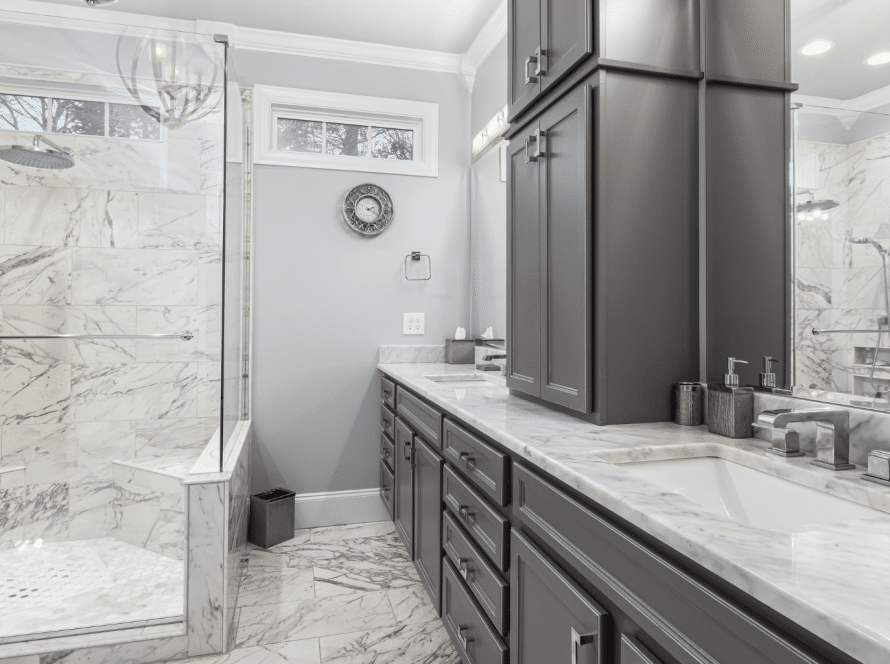A bathroom redesign may be a smart investment, whether you are modernizing old fittings, adding to the convenience, or increasing the value of your home.
But a big question that many homeowners ask themselves: Is a bathroom remodel tax deductible? It is not necessarily so–but in some instances you can claim a tax deduction or a credit. Let’s break it down.
Understanding Tax Deductions vs. Credits
Before diving into bathroom remodels specifically, it’s important to understand the difference between tax deductions and tax credits:
- Tax deductions reduce your taxable income. Example: If you earn $80,000, and take a $10,000 deduction, you’re then taxed on $70,000.
- Tax credits reduce the tax you owe, dollar-for-dollar. Example: If you have a $5,000 tax bill minus a $1,000 credit, you will have $4,000 due.
Now we will see how remodels of bathrooms would fit into the tax system.
When Is a Bathroom Remodel Not Tax Deductible?
In the majority of circumstances, a remodel of a bathroom is said to be a personal expense, and the IRS does not permit personal expenses to be deductible.
This means the following would not be tax deductible:
- Restructuring your bathroom to make it look better
- Modernization of fixtures
- Adding luxury items such as a spa tub or heated floors
These types of improvements are regarded as personal options and not tax-deductible.
Exceptions: When a Bathroom Remodel Can Be Deductible
Certainly, there are some special cases when a bathroom remodel could be a tax deduction or credit.
Home Office Deduction (Partial Remodel)
If you dedicate some of your household space to work, such as the bathroom, to a home office, you can claim the deduction on a partial basis.
This is applicable mostly to self-employed persons or freelancers who ensure the facility is used on a regular basis as the primary location of business. A percentage of the remodel cost may be allottable in case the remodeled bathroom is in, or close to, your home office.
For example:
- You remodel a bathroom that clients or employees use
- You assert 10 percent of your residence to be a business zone, and the bathroom falls under the mentioned zone
- You have to qualify based on IRS rules on a home office deduction, and documentation is critical
Medical Necessity Remodels (ADA Modifications)
At the time of the bathroom remodel, a tax deduction can be taken as a medical expense on all or part of the cost, provided it is done for a medical reason.
Eligible examples include:
- The installation of grab bars or handrails
- Installation of walk-in tub or curbless shower
- Expanding door openings on wheelchairs
- Putting in non-slip flooring
Such modifications are done on prescribed orders by a physician and are needed to suit a medical issue or disability.
The IRS Medical Deductions Rules:
- The costs should be mainly on medical attention
- You should claim deductions on your tax filing (Schedule A)
- The medical costs are subject to over 7.5 percent of your adjusted gross income (AGI)
If the remodel adds value to your home, you may only deduct the amount that does not add value.
For example:
Remodel cost: $10,000
Home value increase: $4,000
Deductible amount: $6,000
Rental Property or Investment Property
In case of a rental property in which you are the owner, and remodel the bathroom, the cost will be deductible or depreciated as a business expense.
- Bathroom renovations of a rental property are classified as improvements and must be depreciated over a period of time, which is the typical 27.5 years.
- Repairs (such as changing a leaky faucet or replacing tiles that broke) can be deducted in the year in which they are performed.
Therefore, the cost can be an allowable deduction in the event that you are renovating a bathroom in a rented premises to appeal to tenants or meet code standards.
Energy-Efficient Upgrades (Limited Cases)
While rare for bathrooms, some energy-efficient improvements may qualify for federal energy tax credits, such as:
- Fitting energy efficient windows in a bathroom
- Installation of a solar powered water heater
- Such upgrades should achieve a certain energy-saving standard and be ENERGY STAR(r)- certified
Check the IRS site or visit a tax professional to find out eligibility.
Can You Deduct a Bathroom Remodel When You Sell Your Home?
You may not be able to write off the bathroom remodel on your annual taxes but when you sell your house, it may pay off.
Capital Improvements and Cost Basis
Bathroom remodels are classified as capital improvements which means that they can:
- Gain on the cost of your home
- Get a reduced tax on capital gains at sale
For example:
Original home purchase: $300,000
Bathroom remodel: $20,000
New cost basis: $320,000
When you sell the house at a price of $500,000, you will only be taxed the capital gains tax over the $180,000 you have made—not the $200,000.
The IRS permits house owners to disregard up to:
- $250,000 in gains (single filers)
- $500,000 of profits (married jointly)
This advantage requires that you keep track of where your capital improvements have gone with time.
What Records Should You Keep?
You will need substantial documentation in case you intend to claim a deduction or to use the remodel cost to inflate your basis on the home.
Here’s what to keep:
- Materials, and labor receipts and invoices
- Evidence of medical necessity (where necessary)
- Before-and-after photos
- Contractor statements
- Prescription of medical changes by doctor
- Copies of tax returns that give itemized deductions
Retain these records not fewer than 7 years. It is more so when you intend to use the remodel to also adjust the cost basis of your home.
Should You Talk to a Tax Professional?
Yes. There is a complicated taxation law that varies quite often.
It is prudent to:
- Seek professional advice from a licensed tax advisor
- Talk about your particular remodel project
- Check deductions or credits eligibility
They will be able to assist you in making the most of your tax savings and avoiding expensive errors.


